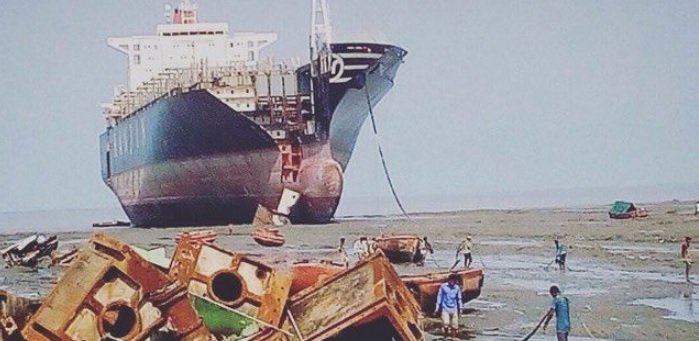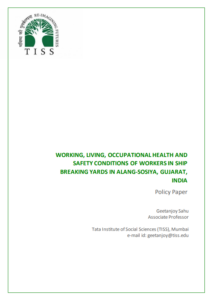The ship breaking activity in developing countries, such as India, Bangladesh and Pakistan, has been subject to criticism because of the negative impacts the industry has on the environment and workers. Now, a report by the Tata Institute of Social Sciences (TISS) in Mumbai found that there has been little improvements in the shipbreaking yards with regards to working conditions. It also presents several breaches of the national legal framework.
Findings
According to the report, there is no lack of labour laws to protect and improve the working conditions and ensure the welfare of workers at the ship breaking yards in Alang-Sosiya (ASSBY). However, the implementation of labour laws and various government appointed committee recommendations have not been effectively applied by different state government departments in Gujarat.
Despite a number of initiatives by the GMB towards the development of ship breaking activities in Alang, the GMB is failing to monitor ASSBY and to provide adequate facilities and infrastructure in the ship breaking yards
A particular concern is that there is no data base about the number of workers in the ship breaking yards. Additionally, the presence of multiple government agencies has not made a significant impact in controlling the behaviour of ship breaking industries to ensure better working conditions. As a matter of fact, there is a lack of effective implementation of both labour and environmental laws in ship breaking industries both by the Central and State Government of Gujarat.
[smlsubform prepend=”GET THE SAFETY4SEA IN YOUR INBOX!” showname=false emailtxt=”” emailholder=”Enter your email address” showsubmit=true submittxt=”Submit” jsthanks=false thankyou=”Thank you for subscribing to our mailing list”]
Another area of concern that the report is focusing on, is that there is little space to raise the workers’ voice in the decision-making process, along with no effective platform to organise them for their collective action to assert their rights.
Namely, about 37% of the interviewed workers do not want to take part in the trade union activities, believing that it could lead to problems for their employment opportunities. As for those who participate in the trade union activities, they confine their role to address basic issues such as sanitation and water supply.
Moreover, the report notes that a key weakness in addressing and resolving workers’ rights at ASSBY is the absence of an active and strong trade union to represent the interests of workers. The trade unions in Gujarat have not taken active interest in mobilising workers and representing their interests to the different government departments.
Living conditions of the workers
- 89% of workers do not receive housing facility from the plot owners even though they are migrant workers;
- The majority of the workers live in and around the ship breaking area in rented shanty dwellings usually without adequate facilities for potable water, sanitation, electricity, drainage systems and education for their children;
- 7 toilets have been constructed by the GMB for workers use but most of them are not properly managed and 56% workers are forced to go for open defecation. Whilst 45% of the interviewed workers have access to toilets at the yard where they work, another 45% do not have access to a toilet facility in their yard. 7% have informed that the toilet in their work place is generally locked, thus they cannot use the facility, whereas 3% find the toilet in their yard very unhygienic;
- 59% of workers pay for water service in their living areas.
Working conditions
- 66% of the workers have informed that provident fund amount from their salary is deducted every month. Out of these, only 20% of the workers have withdrawn their provident funds so far and 46% have informed that the plot owners do not cooperate in processing their provident fund amount;
- 57% of the workers get access to drinking water from a facility in their yard, 12% do not get drinking water in their yard and the remaining workers, i.e. 31%, reveal that whilst a drinking water tap exists in the yard, the quality is not suitable for drinking or the water is not available regularly;
- 87% of the workers do not have access to a dinner hall facility in their work place. Only 12% of workers have access to a dinner hall facility in their work place, whereas 1% cannot use the dinner hall facility as it is only for show off;
- 60% of the workers have informed that the first-aid equipment is available in their yard, 29% do not have access or knowledge of a first-aid box in their yards and the remaining 11% stated that the first-aid box in their respective yard is only for show off;
- 30% of the workers have informed that the safety equipment is available to them in good quality, whereas 36% expressed their dissatisfaction over the quality of safety equipment and 16% have not received any safety equipment;
- In the absence of safety equipment and proper training, 52% of the interviewed workers were injured at workplace during the last year. Of these, 61% had received immediate medical support from their plot owners at the workplace and the remaining 39% did not receive any type of medical support from their plot owners;
- 30% of the workers were paid during their leave period due to injury, whereas 52% did not get any wage or compensation when they were on leave, and the remaining 18% continued to work despite their injuries as they were worried to loose wages;
- ASSBY has just three simple health facilities, two of them run by the Red Cross Society and a small clinic run by a private doctor. Neither have necessary facilities to treat major injuries and potentially fatal emergencies.
Recommendations
The report underlines that there are strong environmental and safety arguments for moving the ship breaking industry to more appropriate locations where heavy lifting equipment and pollution containment can be ensured. To achieve that, it recommends the following suggestions:
- Create a database on migrant workers with regular updates;
- Educate workers about their rights under different labour laws;
- Educate workers about the hazardous activities of the industry;
- Extend the public distribution schemes to migrant workers. Labourers in ASSBY are entitled to get subsidised rations under the public distribution system;
- Revisit the current enforcement strategies by the GMB to ensure that workers live in the labour colony and not in huts lacking basic facilities in and around the ship breaking area;
- Provide regular water and sanitation facility in the living areas;
- Provide compensation for overtime at work;
- Construction of restrooms in the plots by the employers and provide the workers with sufficient time for tea and lunch during their work shift;
- The Employee’s State Insurance Corporation along with the GMB need to take active interest to ensure a full-fledged operational hospital with adequate equipment, experienced doctors and different expertise, available 24 hours;
- Guarantee that each labourer has a health insurance policy and an identity card;
- Regular health camp and study by the health department of Gujarat needs to be done to understand the long-term impacts of ship breaking activities;
- Regular inspection by the factory inspector needs to be carried out to ensure better working conditions during the ship breaking activities. Inspection reports need to be uploaded on the website of the labour and employment department of Gujarat;
- Increase the administrative and financial capacity of staff members in-charge of regular inspection for the implementation of labour laws;
- Expand the current training program for the workers with regards to how to handle disasters and take appropriate safety measures at the work place;
- Ensure that the vessels imported are de-toxified. It has been demanded time and again by various environmental groups, and also the Indian Supreme Court, that the countries which send their ships for scrapping to India, Pakistan and Bangladesh must ensure that their ships are de-toxified in the country to which the ship belongs;
- Implement the Basel Convention on the Control of Transboundary Movements of Hazardous Wastes and their Disposal and other relevant international instruments along with the national laws;
- Agencies required to implement various labour laws need to be accountable. The GMB has to be transparent.
See more information on TISS’s report below

































































